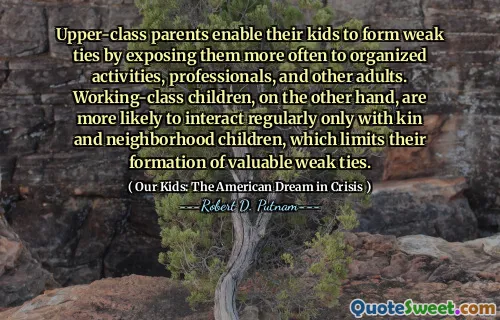Robert D. Putnam is a prominent American political scientist known for his research on social capital and civic engagement. His influential work investigates how social networks and trust within communities contribute to democracy and societal well-being. Putnam argues that over recent decades, Americans have become increasingly disconnected from one another, which negatively impacts political participation and community vitality. His book "Bowling Alone" is a critical examination of the decline in social capital in the United States, presenting data that illustrates a significant reduction in participation in communal activities, from bowling leagues to local civic organizations. In "Bowling Alone," Putnam emphasizes the consequences of social isolation, highlighting how it has led to a deterioration of trust in institutions and a decline in civic engagement. He contends that when individuals are less involved in their communities, broader societal issues suffer, including political polarization and civic apathy. Putnam’s analysis extends beyond mere statistics; he delves into the cultural and economic factors driving this trend, illustrating how changes in lifestyle and technology have reshaped human interaction. Putnam's work advocates for the importance of rebuilding social networks to enhance civic life and foster a thriving democracy. He suggests that by promoting community involvement and harmonious relationships among individuals, society can improve overall health and vitality. His insights continue to resonate, influencing discussions on social cohesion and the role of community in fostering political engagement and public trust.
Robert D. Putnam is a well-respected political scientist recognized for his extensive research on social capital and civic engagement.
He is the author of influential works such as "Bowling Alone," which analyzes the decline of community participation in America.
Putnam's research highlights the importance of social networks for democracy and emphasizes the need for revitalizing community engagement to improve societal health.
More »
Today Birthdays
1955 -
Max Lucado
1946 -
John Piper
1842 -
William James
1907 -
Abraham Joshua Heschel
1887 -
Aldo Leopold
1755 -
Alexander Hamilton
1976 -
Alethea Kontis
1971 -
Mary J. Blige
1825 -
Bayard Taylor
1943 -
Jim Hightower
1885 -
Alice Paul
1923 -
Carroll Shelby
1928 -
David L. Wolper
1954 -
Kailash Satyarthi
1972 -
Amanda Peet
1946 -
Naomi Judd
1970 -
Malcolm D. Lee
1955 -
Christian Marclay
1973 -
Rahul Dravid
1987 -
Jamie Vardy
1942 -
Clarence Clemons
1992 -
Fatima Sana Shaikh
1948 -
Larry Harvey
1930 -
Rod Taylor
